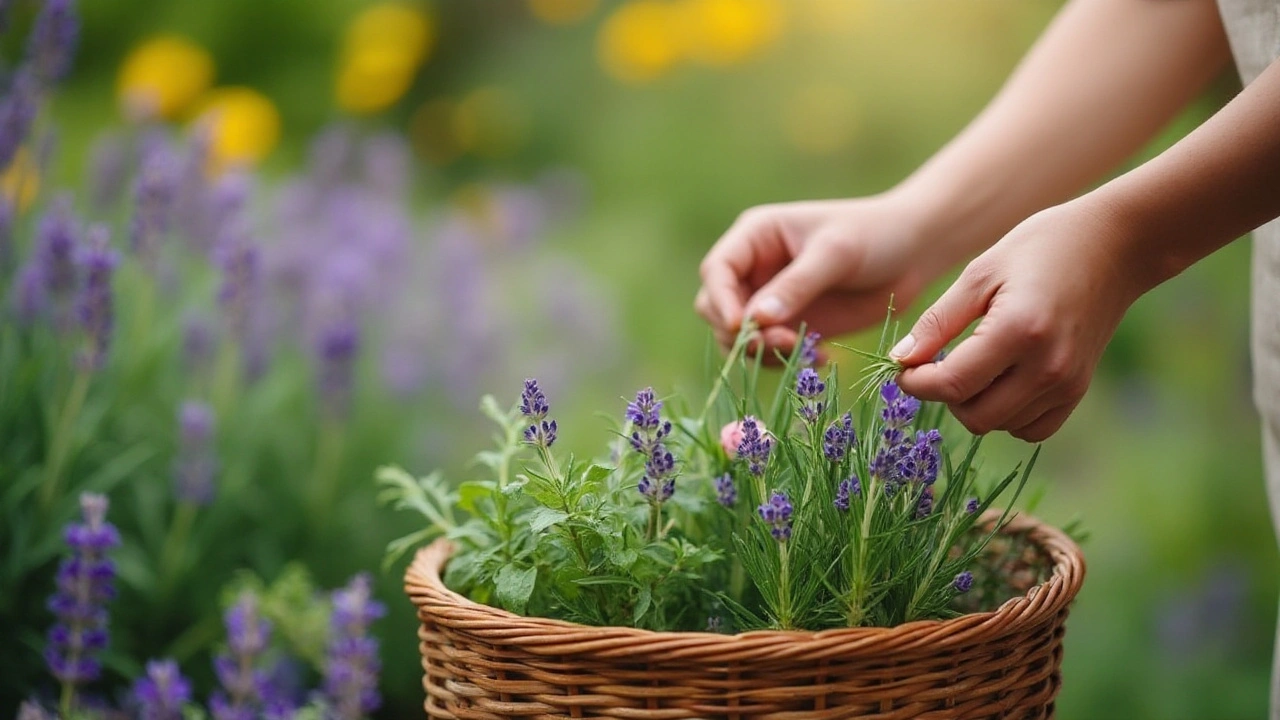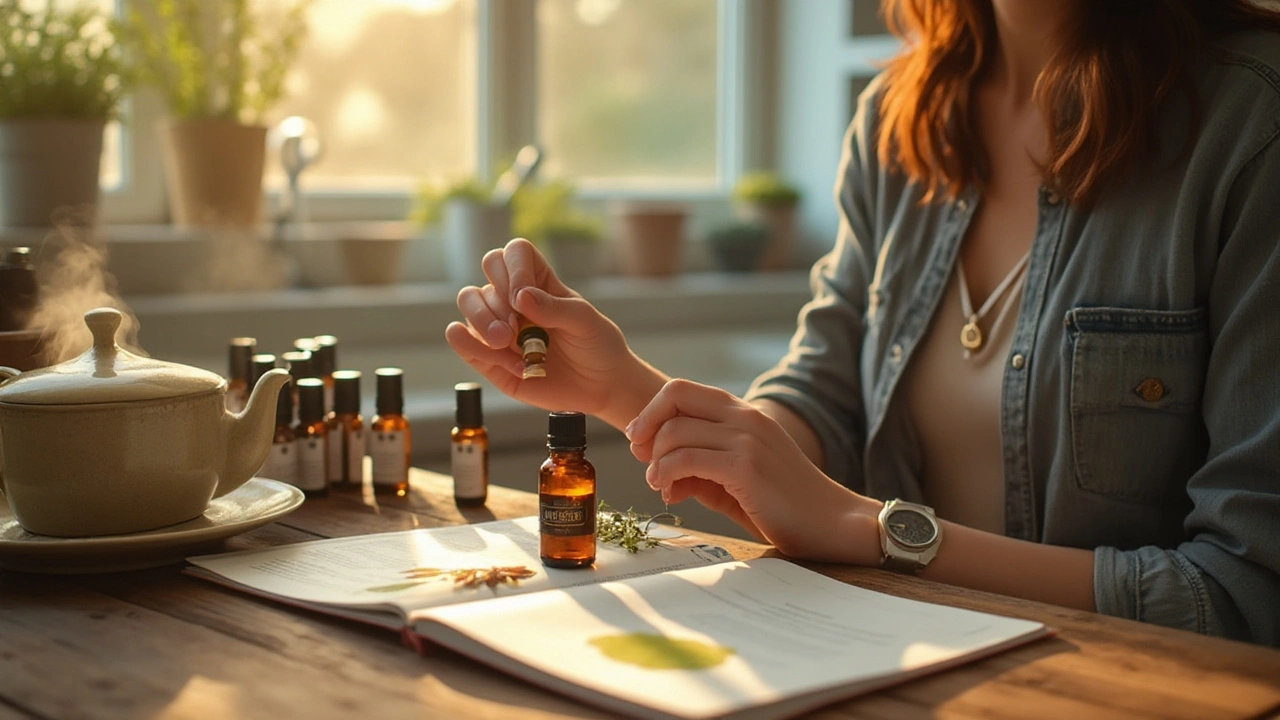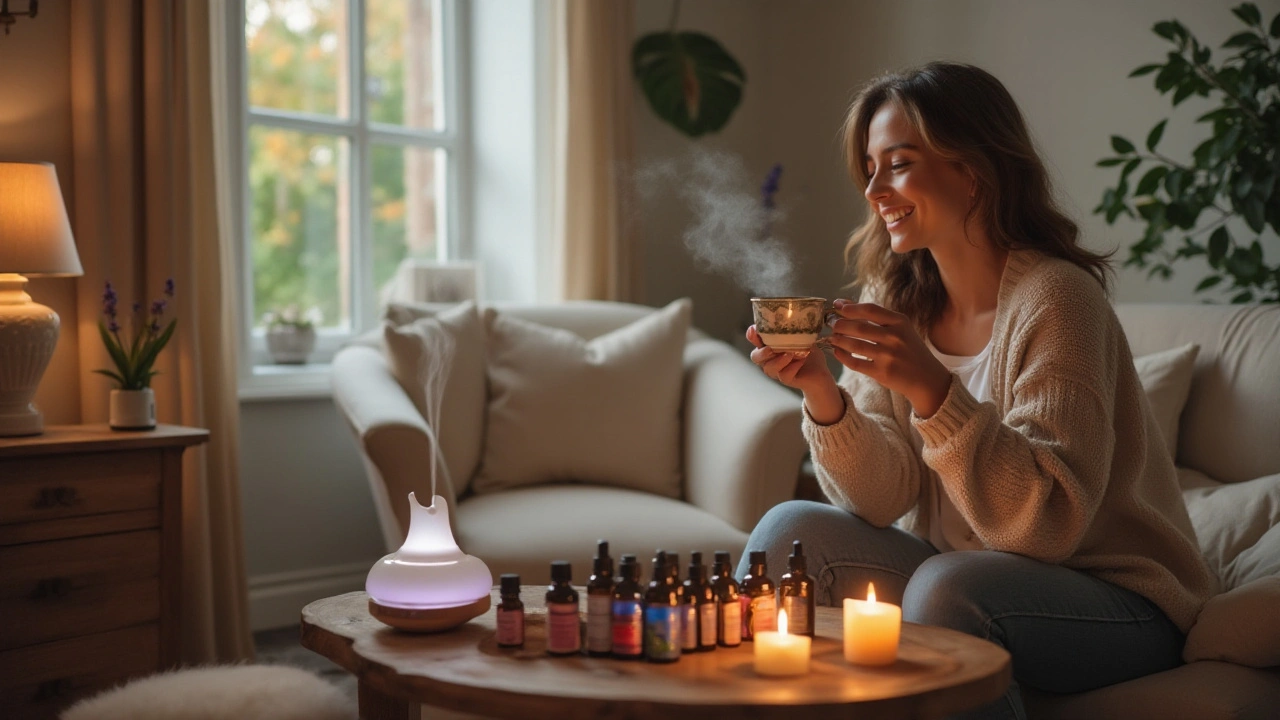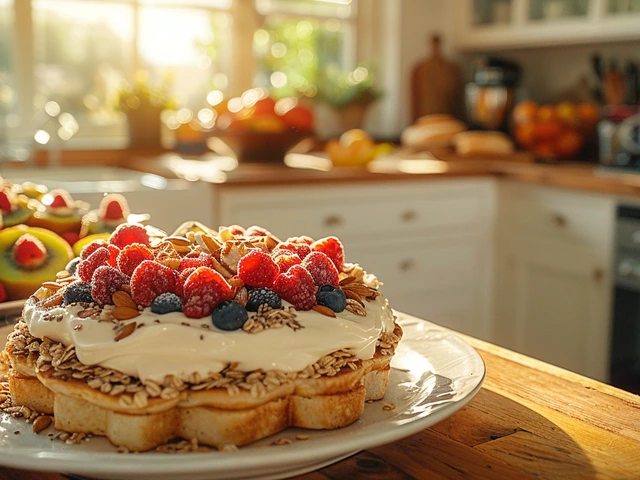Aromatherapy has been around for thousands of years, with its roots deeply embedded in ancient cultures. But what exactly is it, and how can it help you improve your mental wellbeing?
This article explores the fascinating practice of aromatherapy, focusing on how the use of essential oils can play a significant role in enhancing mental health. From reducing stress and anxiety to improving sleep quality, the benefits are vast.
- Introduction to Aromatherapy
- The Science Behind Aromatherapy
- Essential Oils and Their Benefits
- How to Use Aromatherapy at Home
- Tips for Choosing Quality Essential Oils
Introduction to Aromatherapy
Aromatherapy is an ancient practice harnessing the natural essences from plants to promote health and well-being. Its use dates back to ancient Egyptian and Chinese civilizations, where it was not only a part of religious rituals but also an integral part of medicine. Over centuries, the use of aromatherapy has evolved, and today, it is recognized for its myriad benefits in improving mental wellbeing.
At its core, aromatherapy involves using essential oils derived from various parts of plants such as flowers, leaves, bark, and roots. These oils are highly concentrated extracts that capture the plant's scent and beneficial properties. When inhaled or applied to the skin, these oils can trigger responses in the brain through the olfactory system, which is directly linked to the limbic system — the area of the brain responsible for emotions and memory.
"Smell is a potent wizard that transports us across thousands of miles and all the years we have lived." - Helen Keller
The popularization of aromatherapy can be credited to a French chemist named René-Maurice Gattefossé, who coined the term in the 20th century. Following a laboratory accident where he severely burned his hand, Gattefossé applied lavender oil to the wound, noticing a remarkable recovery. This incident led to his pioneering research into the therapeutic benefits of essential oils.
Modern aromatherapy has found its way into various aspects of life, including stress reduction, sleep improvement, and even mood enhancement. Scientific studies have supported these claims, highlighting the effectiveness of essential oils like lavender, chamomile, and peppermint in alleviating anxiety and promoting relaxation.
Integrating aromatherapy into daily routines can be as simple as using an essential oil diffuser, adding oils to bathwater, or applying them in diluted forms to the skin. Whether you are seeking a way to unwind after a long day or looking to boost your mental clarity throughout the workday, aromatherapy offers a natural, holistic approach to achieving better mental wellbeing.
The Science Behind Aromatherapy
The science behind aromatherapy has intrigued many for years. Essential oils, which are the cornerstone of aromatherapy, are derived from plants, flowers, and herbs. These oils carry the plant's essence, including its aroma and therapeutic properties. When we inhale these scents, the molecules travel through our olfactory system to the brain, specifically the limbic system. This area is closely linked to emotions and memories, explaining why certain smells can trigger powerful responses.
Studies have shown that different essential oils have varied effects on the brain and body. Lavender, for example, is well-known for its calming properties. A 2013 study published in the journal Evidence-Based Complementary and Alternative Medicine found that lavender oil can significantly reduce anxiety levels in patients about to undergo surgery. Another study highlighted the benefits of peppermint oil in enhancing memory and increasing alertness, making it a popular choice among students during exams.
The impact of these oils isn't just limited to mental health. Eucalyptus and tea tree oils, for instance, have strong antimicrobial properties and are often used to boost the immune system and fight respiratory infections. Research published in the journal BMC Complementary Medicine and Therapies emphasized the effectiveness of eucalyptus oil in treating respiratory conditions, making it a staple during cold and flu seasons.
"The therapeutic use of plant-derived, aromatic essential oils to promote physical and psychological well-being can be traced back nearly 6,000 years, although modern science is only now beginning to recognize its potential," says Dr. Jane Buckle, an expert in clinical aromatherapy.
The chemistry of essential oils plays a crucial role in their effects. These oils contain various compounds, like terpenes, alcohols, and esters, each contributing to the oil's properties. For instance, terpenes in essential oils can enhance mood and alleviate stress, while esters possess anti-inflammatory and calming effects. Understanding these compounds helps in selecting the right essential oil for specific needs.
Functional magnetic resonance imaging (fMRI) studies reveal that certain essential oils can change brain patterns and reduce the activity in the amygdala, the part responsible for emotions such as fear and anxiety. This reduction explains why inhaling essential oils can have immediate calming effects. The research in this area continues to grow, offering promising insights into the potential of aromatherapy.
The science of aromatherapy also includes the methods of application. Inhalation is the most direct way to impact the emotional brain. Diffusers are commonly used for this purpose, dispersing the essential oils into the air and allowing for easy inhalation. Topical application, where the oils are absorbed through the skin, is another effective method. When applied this way, essential oils not only offer aromatherapeutic benefits but also penetrate the skin to provide localized relief from ailments such as muscle pain or skin irritations.
| Essential Oil | Primary Benefit |
|---|---|
| Lavender | Reduces Anxiety |
| Peppermint | Enhances Memory |
| Eucalyptus | Treats Respiratory Conditions |
The safety and quality of essential oils are paramount. Not all oils are created equal, and it is crucial to choose high-quality, pure essential oils to experience their full benefits. Adulterated oils can be ineffective and may even cause adverse reactions. It is always advisable to perform a patch test before using any oil on the skin.

Essential Oils and Their Benefits
Essential oils are concentrated extracts derived from plants. They capture the plant’s scent, also known as its essence. Over many centuries, these oils have been used not only for their aromatic qualities but also for medicinal and therapeutic purposes. The benefits of essential oils are vast, and their applications numerous. Let's delve into some of the most popular oils and their specific benefits for mental wellbeing.
Lavender oil is one of the most well-known essential oils for promoting relaxation. Scientific studies have shown that it can help reduce anxiety and improve sleep quality. Its calming effect can also ease headaches and tension. A study published in the Journal of Medical Microbiology found that lavender oil can also act as a natural pain reliever, making it a multifaceted addition to your wellbeing toolkit.
Peppermint oil boasts a refreshing and invigorating scent that is known to boost energy levels. It’s particularly useful for combating mental fatigue and improving focus. Inhaling peppermint oil has been shown to help clear the mind, making it a great pick-me-up during long study sessions or work hours. Peppermint can also relieve sinus congestion, which often contributes to a feeling of overall mental fog.
Bergamot oil is often used to uplift the mood and alleviate stress. This citrusy oil has been found to contain compounds that can reduce the levels of stress hormones in the body. A study involving subjects with anxiety disclosed that exposure to bergamot oil resulted in a significant reduction in cortisol levels, contributing to a feeling of calm and wellbeing.
Dr. Jane Buckle, an expert in clinical aromatherapy, notes, "Aromatherapy can significantly affect a person’s emotional state. The right essential oil can make a remarkable difference in mental health management."
Frankincense oil has long been used in spiritual and religious ceremonies for its grounding properties. Inhaling the scent can create a sense of calm and centeredness, making it an excellent choice for meditation and contemplation. Research also suggests that frankincense may have anti-inflammatory properties, which can help reduce the physical symptoms of stress.
Rosemary oil is considered to be a brain booster. Its stimulating properties are known to enhance memory and cognitive function. A study by the University of Northumbria indicated that participants exposed to rosemary scent demonstrated improved memory and increased alertness compared to those who were not exposed. The oil’s invigorating attributes make it an excellent choice for those looking to enhance mental clarity.
These are just a few examples of how essential oils can benefit your mental wellbeing. They can be used in various ways, such as through inhalation, topical applications, or even added to baths for a relaxing experience. However, it’s important to use them appropriately. Always dilute them with a carrier oil like coconut or almond oil to prevent skin irritation and ensure you're using high-quality, pure oils for the best results.
| Essential Oil | Benefit |
|---|---|
| Lavender | Reduces anxiety, improves sleep |
| Peppermint | Boosts energy, enhances focus |
| Bergamot | Elevates mood, alleviates stress |
| Frankincense | Promotes calm, anti-inflammatory |
| Rosemary | Enhances memory, increases alertness |
Incorporating these oils into your daily routine can offer a natural and effective way to boost mental wellness. The power of scent is profound, influencing our bodies and minds in ways we are only beginning to understand fully. Experiment with different oils and find the combination that works best for you. Their benefits could very well become a cornerstone of your mental health regimen.
How to Use Aromatherapy at Home
Setting up aromatherapy at home is simpler than you might think. First, you need to select your essential oils. These oils are the key to aromatherapy, each offering unique benefits. Common choices include lavender for relaxation, peppermint for energy, and eucalyptus for respiratory relief. Quality is critical, so make sure to opt for reputable brands that guarantee purity.
Once you have your oils, the next step is to decide how you want to use them. There are several methods, each offering a different experience. One popular choice is using a diffuser, which disperses the oil into the air, making your entire room smell divine. Another simple method is to add a few drops to a bowl of hot water and inhale the steam, a practice known as steam inhalation. This is particularly beneficial for clearing the sinuses.
For a more tactile experience, consider making your own aromatherapy spritzers. These are easy to make; just combine water, essential oil, and a bit of vodka or witch hazel to help disperse the oil. You can spray this mixture on your linens, around your room, or even use it as a light body mist. Massage oils are yet another delightful option. Simply blend essential oils with a carrier oil like jojoba or sweet almond oil and apply to your skin. This method not only offers the benefits of the oil but also the comfort of a gentle massage.
If you enjoy baths, adding essential oils to your bathwater is an excellent way to unwind. Since oils don’t mix well with water, combining them with a carrier oil or an unscented bath gel ensures they disperse evenly. Imagine sinking into a warm bath infused with lavender, melting away your stress after a long day. Essential oils can also be used in homemade candles, turning your home into a soothing oasis with their gentle glow and therapeutic scents.
Lastly, integrating aromatherapy into your everyday routine can be as simple as using essential oil rollers. These handy little bottles fit right in your bag and allow you to apply the oils directly to your skin whenever you need a quick pick-me-up. Whether you're facing a stressful situation at work or need help focusing, a quick roll of peppermint on your temples can make a world of difference.
It's important to note that while aromatherapy is generally safe, it’s crucial to follow guidelines for essential oil use. Some oils might cause skin irritation or have contraindications with certain medical conditions. Always do a patch test before using a new oil on your skin and consult with a healthcare professional if you have any concerns.
“Aromatherapy can be a simple yet powerful way to enhance your mental wellbeing at home,” emphasizes Dr. Alex Johnson, a leading expert in holistic health.
Incorporating aromatherapy into your home life can transform your living space into a sanctuary of peace and relaxation. By choosing the right oils and using them safely, you can enjoy their many mental and emotional benefits every day.

Tips for Choosing Quality Essential Oils
With the rising popularity of aromatherapy, the market is flooded with numerous essential oils. This can make selecting the right ones a daunting task. Choosing quality essential oils is crucial because not all products are created equal. A high-quality essential oil ensures you reap the maximum mental wellbeing benefits.
First, look at the label. High-quality essential oils should be labeled with the plant's botanical name (like Lavandula angustifolia for lavender) and the plant part used. Labels should also mention the country of origin and the method of extraction. If this information is missing, consider it a red flag. Always buy from reputed brands that pride themselves on transparency and quality control.
“Not all essential oils are created equal. Always check for third-party testing to ensure the oil's purity and quality,” advises Dr. Mary Jones, an expert in natural therapies.
Next, consider the price. Pure essential oils require many plants to produce just a small amount. If the price seems too good to be true, it probably is. Beware of oils marketed at very low prices because they might be diluted with cheaper oils or synthetic ingredients, which could negate their effectiveness and potentially be harmful.
Another important factor is the container. Essential oils are sensitive to light and heat, which can degrade their quality. This is why legitimate products are typically sold in dark glass bottles—either amber or cobalt blue. Avoid oils sold in plastic bottles or clear glass because they may not maintain the oil’s purity.
Lastly, pay attention to the fragrance. High-quality essential oils usually have a very strong, potent scent. If you smell an unusual odor—one that’s either too faint or too harsh—it’s a sign the oil isn’t up to par. Do a patch test: place a drop on a cotton ball and carry it around for a day to see if the scent is consistent and pleasant.
Certification and Testing
Look for oils that have been third-party tested for purity. Some companies may claim their oils are pure, but without testing, there’s no way to be sure. Brands that offer test results show confidence in their products. Certificates of Analysis (COA) or Gas Chromatography-Mass Spectrometry (GC-MS) test results are the gold standards here. These reveal the composition of the oil and rule out the presence of harmful additives.
| Criteria | Importance |
|---|---|
| Label transparency | High |
| Price point | Moderate |
| Packaging | High |
| Fragrance | Moderate |
| Certification | High |
Knowing how to choose quality essential oils empowers you to maximize the mental health benefits of aromatherapy. By being mindful of what to look for, you can make informed choices that will enrich your life with the purity and potency you deserve.





